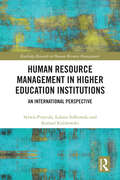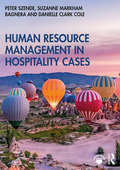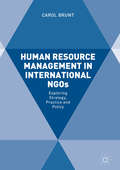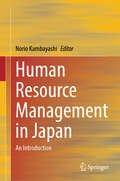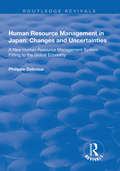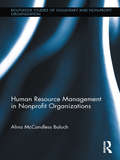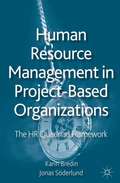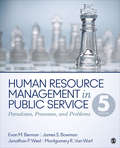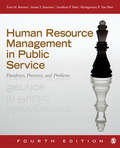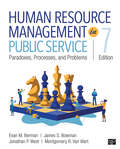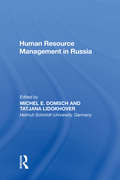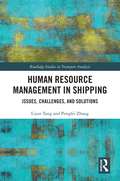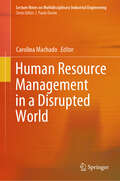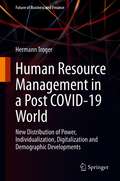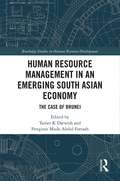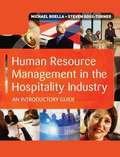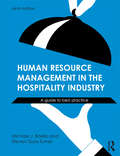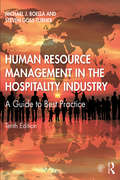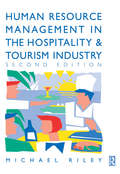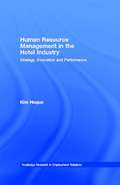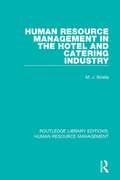- Table View
- List View
Human Resource Management in Higher Education Institutions: An International Perspective (Routledge Research in Human Resource Management)
by Łukasz Sułkowski Sylwia Przytuła Konrad KulikowskiIn an era marked by increasing globalization, international competition, digitalization, and social and cultural changes, higher education institutions (HEIs) play a pivotal role in establishing the knowledge-based economy of each country, which is perceived as its soft power. The need to explore and highlight the specificity of human resource management (HRM) practices in higher education institutions has become urgent and evident. This book provides new theoretical and practical insights into HRM in HEIs. A profound analysis of the global literature clearly exposes that human resource practices are often applied in academia as single solutions rather than as a systematic approach to planning, attracting, motivating, developing, and retaining scientists. The global trends in academia, such as the need for branding and positioning in higher education ranking systems, growing retention and brain circulation between academia and business, diversity in academia, and the digitalization of teaching, have resulted in challenges such as de-recruitment, academic burnout and ill-being, and technostress, which are also addressed in this book.
Human Resource Management in Hospitality Cases
by Peter Szende Suzanne Markham Bagnera Danielle Clark ColeHuman Resource Management in Hospitality Cases adopts a practical case-based approach to develop critical thinking and problem-solving skills in future hospitality managers. Using tried-and-tested real-life scenarios, this book thoroughly prepares hospitality students for a career in the field. Chapters are comprised of 75 short vignettes, split into nine sections that reflect and cover the primary challenges facing hospitality managers on a daily basis, including leadership credibility, building and managing employee performance, managing a diverse workforce, dealing with problem behaviors, and many others, all contextualised within the hospitality industry. With a main "think point" and series of questions for each case, the book is a highly insightful and engaging read. Suggested answers and solutions to the questions can be found within the extensive online resources that complement the book. Each section is also contextualized and theorized with an additional reading section, organized by key concept. This book will be essential for all students of hospitality and an invaluable resource for current practitioners in the field as well.
Human Resource Management in International NGOs
by Carol BruntThis insightful book examines human resource management practice and its perceived impact on performance in the non-profit sector. Presenting case studies of six NGOs in Kenya, it explores HRM practices in a non-profit setting, and uncovers details about HRM practice by organizations in the development sector that are not found in NGO management books. Informed by the author's practical experience in the field, Human Resource Management in International NGOs is a unique study that marries theory and practice, challenging the reader to reflect on the interpretative application of management theory and stakeholder participation.
Human Resource Management in Japan: An Introduction
by Norio KambayashiThis textbook provides an introductory-level description of the history and current status of human resource management (HRM) in Japanese companies and its potential for future development. The book facilitates the learning of the basic mechanisms of organizational behavior, work management in organizations, and HRM systems in Japanese companies, including employment management, human resource development, evaluation, promotion, wages and benefits, and labor–management relations. In addition, the book makes available information on contemporary issues facing Japanese companies, such as globalization, diversity management, and management of the work–life balance. In general, the book offers an easy-to-understand explanation of how and why the HRM systems of Japanese companies differ from those in other Asian countries, the USA, and Europe. Readers will see that the communal HRM systems in Japanese companies is in the process of being transformed into a market-basedsystem as the momentum of global capitalism gradually permeates Japanese society. In addition, they will learn how Japanese companies are seeking to gain competitive advantage under the advance of globalization on the basis of human resources.
Human Resource Management in Japan: Changes and Uncertainties - A New Human Resource Management System Fitting to the Global Economy (Routledge Revivals Ser.)
by Philippe DebrouxThis title was first published in 2003. Seeking to demonstrate a high level of insight, this is an analysis of the characteristics and advantages of Japanese human resource management. It describes the situation and the main trends in the transformation of the Japanese human resource management and employment practices, and investigates the possible options for the future. The work should be useful to academics and policy makers dealing with Japan and courses on human resource management and economics.
Human Resource Management in Nonprofit Organizations (Routledge Studies in the Management of Voluntary and Non-Profit Organizations)
by Alina McCandless BaluchHuman resource management (HRM) can aid nonprofit organizations (NPOs) in facing uncertain, changing environments of funding pressures, increasing competition and demand for services as well as internal challenges. As the distinguishing features of NPOs can render the professionalization of HRM different from the private and public sectors, this book fills a gap in the literature by offering an in-depth look at how this distinctive nature of NPOs shapes the development and implementation of their HR practices. Timely and topical, this book addresses the professionalization of HRM in the nonprofit sector using examples from an exploratory multiple case study of NPOs selected across different fields. Not only does it offer both students and practitioners in the field of HRM and nonprofit management a better understanding of the specific challenges for HRM that stem from the management of several, contradictory bottom lines in NPOs, but it also highlights the opportunities that distinguishing nonprofit features create for the development and implementation of HR practices. By illustrating how NPOs can invest in learning and adapting processes that aid them in the alteration of HRM, this book is an essential resource for those involved in designing, implementing and studying HRM in NPOs.
Human Resource Management in Project-Based Organizations
by Karin BredinPresenting findings from research into Sweden's leading multinationals this book focuses on engineering companies operating in global industries such as pharmaceutical, aerospace, packing systems and automotive. It explores research and practice within the area of HRM focusing on project-based organizations.
Human Resource Management in Public Service: Paradoxes, Processes, and Problems
by Dr James S. Bowman Dr Jonathan P. West Evan M. Berman Dr Montgomery R. Van WartHuman Resource Management in Public Service: Paradoxes, Processes, and Problems offers managers and aspiring managers a thorough, provocative, and award-winning coverage of the complex issues of management in the public sector, from both employee and managerial viewpoints. Combining more than 100 years of professional and academic experience, authors Evan M. Berman, James S. Bowman, Jonathan P. West, and Montgomery Van Wart have created user-friendly and accessible material by highlighting dilemmas, challenging readers to resolve them, and enticing them to go beyond the text to discover and confront other dilemmas. Grounded in real public service experiences, the book emphasizes hands-on skill building and problem solving. Continuing the award-winning tradition of previous editions, this Fifth Edition covers all of the stages of the employment process, including recruitment, selection, training, legal rights and responsibilities, compensation, and appraisal.
Human Resource Management in Public Service: Paradoxes, Processes, and Problems
by Dr James S. Bowman Dr Jonathan P. West Evan M. Berman Dr Montgomery R. Van WartHuman Resource Management in Public Service: Paradoxes, Processes, and Problems offers managers and aspiring managers a thorough, provocative, and award-winning coverage of the complex issues of management in the public sector, from both employee and managerial viewpoints. Combining more than 100 years of professional and academic experience, authors Evan M. Berman, James S. Bowman, Jonathan P. West, and Montgomery Van Wart have created user-friendly and accessible material by highlighting dilemmas, challenging readers to resolve them, and enticing them to go beyond the text to discover and confront other dilemmas. Grounded in real public service experiences, the book emphasizes hands-on skill building and problem solving. Continuing the award-winning tradition of previous editions, this Fifth Edition covers all of the stages of the employment process, including recruitment, selection, training, legal rights and responsibilities, compensation, and appraisal.
Human Resource Management in Public Service: Paradoxes, Processes, and Problems
by Evan M. Berman Dr. James S. Bowman Dr. Jonathan P. West Dr. Montgomery R. Van WartRecognizing the inherent tensions and contradictions that result from managing people in organizations, Human Resource Management in Public Service: Paradoxes, Processes, and Problems offers provocative and thorough coverage of the complex issues of management in the public sector. Continuing the award-winning tradition of previous editions, this Sixth Edition helps you to understand complex managerial puzzles and explores the stages of the employment process, including recruitment, selection, training, legal rights and responsibilities, compensation, and appraisal. Grounded in real public service experiences, the book emphasizes hands-on skill building and problem solving. New to the Sixth Edition: Ethics case studies have been added to all the chapters, enabling you to learn about a variety of ethical situations that come up in management. Updated and consolidated recruiting strategies offer you a window into the most current methods used in the recruitment process and provide insight into the job seeker’s perspective. New examples from a broad range of local, state, federal, and international settings enable you to apply key concepts to common management issues.
Human Resource Management in Public Service: Paradoxes, Processes, and Problems
by Evan M. Berman Dr. James S. Bowman Dr. Jonathan P. West Dr. Montgomery R. Van WartRecognizing the inherent tensions and contradictions that result from managing people in organizations, Human Resource Management in Public Service: Paradoxes, Processes, and Problems offers provocative and thorough coverage of the complex issues of management in the public sector. Continuing the award-winning tradition of previous editions, this Sixth Edition helps you to understand complex managerial puzzles and explores the stages of the employment process, including recruitment, selection, training, legal rights and responsibilities, compensation, and appraisal. Grounded in real public service experiences, the book emphasizes hands-on skill building and problem solving. New to the Sixth Edition: Ethics case studies have been added to all the chapters, enabling you to learn about a variety of ethical situations that come up in management. Updated and consolidated recruiting strategies offer you a window into the most current methods used in the recruitment process and provide insight into the job seeker’s perspective. New examples from a broad range of local, state, federal, and international settings enable you to apply key concepts to common management issues.
Human Resource Management in Public Service: Paradoxes, Processes, and Problems
by James S. Bowman Jonathan P. West Evan M. Berman Montgomery R. Van WartHuman Resource Management in Public Service: Paradoxes, Processes, and Problems Fourth Edition offers provocative and thorough coverage of the complex issues of management in the public sector, from both employee and managerial viewpoints. It discusses the issues, explains how they arise, and suggests what can be done about them. It continues to offer paradoxical perspectives about the inherent challenges as well as the unique political and legal context of the public sector management within which they take place. The book covers all of the stages of the employment process, including recruitment, selection, training, legal rights and responsibilities, compensation, and appraisal. Grounded in real public service experiences, the book emphasizes hands-on skill building and problem solving.
Human Resource Management in Public Service: Paradoxes, Processes, and Problems
by James S. Bowman Jonathan P. West Evan M. Berman Montgomery R. Van WartHuman Resource Management in Public Service: Paradoxes, Processes, and Problems offers provocative and thorough coverage of the complex issues faced by employees and managers in the public sector, including managing under tight budgets with increasing costs, hiring freezes, contracting out, and the politicization of the civil service. Continuing the award-winning tradition of previous editions, authors Evan M. Berman, James S. Bowman, Jonathan P. West, and Montgomery R. Van Wart encourage active learning through various skill-building exercises and a mixture of individual, group, and in-class tasks. The Seventh Edition includes new examples on how COVID-19 has disrupted the workplace, equity and racial discord, organizational diversity, employee engagement and motivation, leadership development training, work-life balance, gender-based inequities, behavioral biases in appraisal, and unionization trends.
Human Resource Management in Public Service: Paradoxes, Processes, and Problems
by James S. Bowman Jonathan P. West Evan M. Berman Montgomery R. Van WartHuman Resource Management in Public Service: Paradoxes, Processes, and Problems offers provocative and thorough coverage of the complex issues faced by employees and managers in the public sector, including managing under tight budgets with increasing costs, hiring freezes, contracting out, and the politicization of the civil service. Continuing the award-winning tradition of previous editions, authors Evan M. Berman, James S. Bowman, Jonathan P. West, and Montgomery R. Van Wart encourage active learning through various skill-building exercises and a mixture of individual, group, and in-class tasks. The Seventh Edition includes new examples on how COVID-19 has disrupted the workplace, equity and racial discord, organizational diversity, employee engagement and motivation, leadership development training, work-life balance, gender-based inequities, behavioral biases in appraisal, and unionization trends.
Human Resource Management in Russia (Contemporary Employment Relations Ser.)
by Michel E. Domsch Tatjana LidokhoverInvestigating Human Resource Management issues in Russia, this volume looks at the current state of Human Resource practice within Russian enterprises; its various problems and possible solutions. Following a detailed introduction into the current economic developments taking place in Russia, the book examines the new role of the HR department in Russian enterprises, and the influence of national politics on HR practice. The book also discusses key HRM issues such as recruitment and selection, training and development, payment and compensation, before surveying the various HR problems encountered by multinational companies working in Russia.
Human Resource Management in Shipping: Issues, Challenges, and Solutions (Routledge Studies in Transport Analysis)
by Pengfei Zhang Lijun TangThis book sheds light on the nature and causes of the issues and challenges in human resources in shipping and proposes fresh recommendations to manage them. It explains the multiple forces at play, including the global regulatory regime, national institutional frameworks, industrial practices, trade union responses, and pressures from customers and non-governmental organisations. Human Resource Management in Shipping integrates seafarer employment data released by national maritime authorities and a large body of literature that discusses discrete human resources issues in shipping into a single volume, providing readers with a comprehensive understanding of the issues and challenges within human resources in shipping. Beyond this, the book also offers a fresh perspective on some of the long lasting HRM challenges in the industry, such as skills shortage and seafarer recruitment and retention. This book aims to provide readers with systematic and in-depth knowledge of human resource management in shipping, and offers researchers a valuable source of reference and a solid foundation on which further development can be built.
Human Resource Management in a Disrupted World (Lecture Notes on Multidisciplinary Industrial Engineering)
by Carolina MachadoThis book presents a selection of the most insightful research shared at the XII International Conference on Intervention in Human Resources, themed &“HRM in a World in Disruption: At the Crossroads of People Management.&” It brings together studies that explore innovative strategies, challenges, and best practices in human resource management. Readers will find research-based discussions on how HR professionals and organizations are adapting to disruption, addressing workforce challenges, and implementing new management approaches. The book covers topics such as talent development, digital transformation in HR, leadership in uncertain times, and strategies for fostering resilience in organizations. Designed for academics, researchers, HR professionals, and students, this book provides valuable insights for those interested in the evolving landscape of human resource management.
Human Resource Management in a Post COVID-19 World: New Distribution of Power, Individualization, Digitalization and Demographic Developments (Future of Business and Finance)
by Hermann TrogerThis book presents a novel viewpoint in HR management: in addition to the macroeconomic factors (demographic development, industry 4.0, digitization, etc.) and its micro-political counterparts (shortage of skilled workers, an aging workforce, shortage of MINTs), personnel policy in the highly developed economic regions of the world can increasingly be seen from the third point of view, which is the ego-perspective. The complexity of the economic world 4.0 is manifesting itself for the employees in a working world of unlimited possibilities, offering almost limitless freedom of choice, especially for younger people. Due to this shift in the balance of power, the influence of the employers decreases and is often reduced to countering the pronounced self-confidence of the employees in asserting their expectations with corresponding company incentives. The author emphasizes that dealing with the challenges of this extremely fragile world of work - currently exacerbated by the COVID-19 pandemic - must by no means be left solely in the hands of overburdened personnel managers. The contribution of the line manager or direct superior is becoming increasingly important. And it is only through close and clearly defined cooperation between the two that the opportunity for effective human resources management lies. This book aims to illustrate this process of division of labor in the individual phases of personnel management.
Human Resource Management in an Emerging South Asian Economy: The Case of Brunei (Routledge Studies in Human Resource Development)
by Tamer K Darwish Pengiran Muda Abdul FattaahThis book focuses on human resource management (HRM) in the country context of Brunei Darussalam, analysing, comparing and contrasting domestic enterprises (DEs) with multinational enterprises (MNEs), and oil and gas with non-oil and -gas sectors, and draws out the comparative lessons for understanding the potential and performance consequences of HR interventions in resource-centred national economies. Work carried out more recently drawing a contrast between Asian capitalisms has established a number of important defining aspects inherent in economies in Asia; this helps to present approaches to establishing the way in which Brunei may be seen to be aligned with, and depart from, other business systems and frameworks in Asia. The existing literature highlights a trend towards focusing on the Asian context; however, most studies have focused on specific Asian countries, and research conducted in other contexts remains scarce. As the region gains economic prosperity, it is increasingly important to conduct some work that will be able to highlight the relevant HRM system(s) for other Asian contexts. Although some emerging Asian economies are still quite far from achieving developed nation status, it is however essential to understand the HRM systems prevalent in such economies as they can contribute greatly to the economic development there. Hence, this book highlights the importance of viewing the development and nature of HR in Brunei and locates the practice of HRM within the wider economic and political context, and draws out the theoretical and practical implications for understanding continuity in change in HR practice, and similarities with and differences from other emerging markets. It will be of interest to researchers, academics, and students in international and comparative human resource management.
Human Resource Management in the Hospitality Industry
by Michael Boella Steven Goss-TurnerNow in its eighth edition, Human Resource Management in the Hospitality Industry: an introductory guide, is fully updated with new legal information, data, statistics and examples, and includes brand new material on multi unit operations and management.Taking a 'process' approach, it guides the reader through every stage from HR planning through recruitment to termination/separation, covering the following issues:* Selection, appointment and induction* Training and management development* Labour turnover* Employee relations and employment law* Managing people and customer care* Business EthicsWritten in a user friendly style, each chapter includes international examples, bulleted lists, guides to further reading and exercises to test knowledge.
Human Resource Management in the Hospitality Industry: A Guide to Best Practice
by Michael Boella Steven Goss-TurnerNow in its ninth edition, Human Resource Management in the Hospitality Industry: A Guide to Best Practice, is fully updated with new legal information, data, statistics and examples. Taking a 'process' approach, it provides the reader with an essential understanding of the purpose, policies and processes concerned with managing an enterprise's workforce within the current business and social environment. Since the eighth edition of this book there have been many important developments in this field and this ninth edition has been completely revised and updated in the following ways: Extensively updated content to reflect recent issues and trends including: labour markets and industry structure, impacts of IT and social media, growth of international multi - unit brands, role of employer branding, talent management, equal opportunities and managing diversity. All explored specifically within the Hospitality Industry The text explores key issues and shows real life applications of HRM in the Hospitality industry and is informed through the authors' research projects within Mitchells & Butler's plc, Pizza Express, Marriott Hotels and Café Rouge. An extended case study drawing from the authors' experience working with Forte and Co., Centre hotels, Choice Hotels and Bass, Price Waterhouse and Grant Thornton Written in a user friendly style and with strong support from the Institute of Hospitality, each chapter includes international examples, bulleted lists, guides to further reading and exercises to test knowledge.
Human Resource Management in the Hospitality Industry: A Guide to Best Practice
by Steven Goss-Turner Michael J. BoellaHuman Resource Management in the Hospitality Industry: A Guide to Best Practice takes a ‘process’ approach and provides the reader with an essential understanding of the purpose, policies and processes concerned with managing an enterprise’s workforce within the current business and social environment. Since the ninth edition of this book there have been many significant developments in this field and this new edition has been completely revised and updated in the following ways: Extensively updated content to reflect recent issues and trends relevant to the hospitality industry including: changing labour market profiles and the ‘gig’ economy, the digital transformation of HRM practices, employer branding developments, talent management strategies, employee well-being considerations, and contemporary concerns over diversity, gender and harassment at work. Five new chapters on: organizational culture, modern labour markets, emotions and well-being, careers in hospitality, and digital HRM. New international case studies throughout to explore key issues and show real-life applications of HRM in the hospitality industry. Written in a user-friendly style, each chapter includes international examples, bulleted lists, guides to further reading and exercises to test knowledge.
Human Resource Management in the Hospitality and Tourism Industry
by Michael RileyThis fully updated and expanded second edition of Human Resource Management examines the role of human resource management in the hospitality and tourism industry. The subject is approached from four perspectives: * the social psychology of managing people * the economics of labour * the practical techniques * strategy. The author argues that labour costs, labour utilisation, labour market behaviour and pay are inseparable from the skills of managing people. The book contains an important analysis of the labour market for this industry and now, in its second edition includes, among others, chapters on attitude measurement, customer-employee relations, questionnaire design and organizational change. Human Resource Management in the Hospitality and Tourism Industry is written in a clear, user-friendly style and offers a challenging view of the subject and an opportunity to learn an important aspect of management in an applied context. It is appropriate for degree level students and practitioners in the industry.
Human Resource Management in the Hotel Industry: Strategy, Innovation and Performance (Routledge Research in Employment Relations #Vol. 2)
by Kim HoqueOver the last decade, human resource management has come to be viewed as the dominant paradigm within which analyses of the world of work have been located. This volume examines the nature and assesses the impact of HRM within a highly under-researched division of the service sector, namely the UK hotel industry. Common perceptions of management practices in the hotel industry typically include work intensification, high labour turnover, lack of training and poor career prospects, and casualised terms and conditions of employment. Using data from a survey of over 200 hotels, this book challenges such stereotypes by demonstrating that this part of the service sector is just as likely to have experimented with new approaches to HRM as the manufacturing industry. It suggests that primary influences on managerial decision-making in the hotel industry are no different from the primary influences affecting decision-making elsewhere, countering the argument that mainstream management theories are inapplicable within the hotel industry. Furthermore, where hotels emphasise the importance of service quality enhancement and where they introduce HRM as an integrated, mutually supporting package of practices, a strong relationship between HRM and organisational performance is proposed.
Human Resource Management in the Hotel and Catering Industry (Routledge Library Editions: Human Resource Management)
by M. J. BoellaThis book, first published in 1987, gives valuable insights into the characteristics of employment in the hotel and catering industry and useful guidance on personal techniques. It deals with fundamental issues, such as personnel policy, as well as with practical techniques. Human Resource Management in the Hotel and Catering Industry has been written as an introductory text to human resource management in the hospitality industry. It is suitable reading for students, line managers and personnel managers in the many different sectors of the business.
